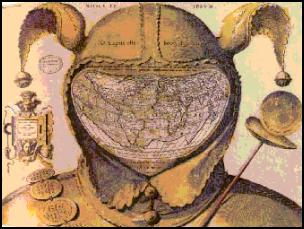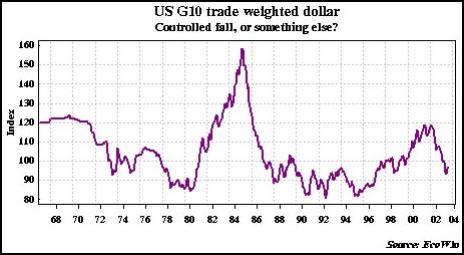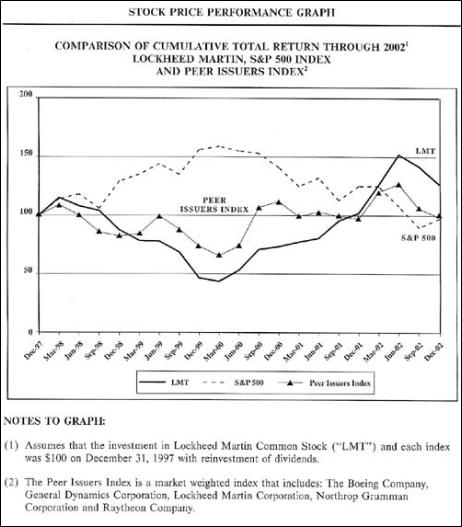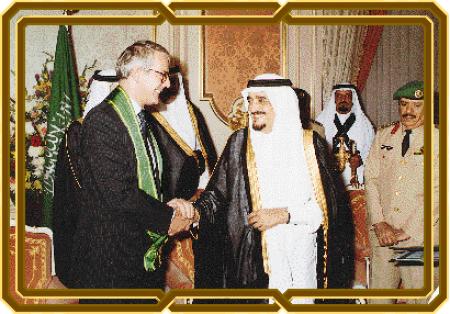SRA: Nationalise Defence, Internationalise Oil
SRA Commentary: Nationalise Defence, Internationalise Oil

By Chris Sanders
October
2003
Hatreds never cease by hatreds in this world. By love alone they cease. This is an ancient law.- The Buddha
Sharon was a killer obsessed with hatred of the Palestinians. I had promised Arafat that his people would not get any harm. Sharon, however, ignored this commitment entirely. Sharon's word is worth nil.
- US Ambassador Philip Habib, special Middle East Envoy for Ronald Reagan, 1982
Hang me if you want as a war criminal. What you don't understand is that the dirty work of Zionism is not over yet. Far from it.- Ariel Sharon to Amos Oz, 1982
We never forget who we're working for.
- Lockheed Martin corporate motto

Transforming taxpayer dollars into Lockheed profits
A firm grasp of the obvious?
The communiqué of the G7 meeting concluded over the weekend of September 20 and 21 was a masterpiece of the obvious. ''Exchange rates should reflect market fundamentals'' was the tired and hackneyed phrase used, followed by the implicitly contradictory ''We emphasize that more flexibility is desirable for major countries or economic areas to promote smooth and widespread adjustments in the international financial system….''

It is a testament to the controlled market press and the finance industry's legions of economists that the G7 finance ministers can regularly invoke the market while vigorously pursuing policies designed to frustrate the market from operating. If investors and traders had been allowed to act in the foreign exchange markets according to fundamentals over the last ten years, the Japanese yen would have long since traded at 50 yen to the dollar and recovered to 90 or so by now. The US would have had its long-postponed cathartic adjustment to the end of the Cold War, would be busily rebuilding American industry and exports, in all likelihood George W. Bush would not be president and Bill Clinton would be grifting in Little Rock. America’s so-called defence industry would have been downsized to something more appropriate for defence instead of the offensive, corrupt and bloated warfare for corporate welfare program that it really is.
The take in Washington on the Asian currency issue is that it really is Asia's problem. In the narrow sense of the US being a major market for Asian exports, there is some truth to this idea, but it is very out of date. When Nixon took the US off gold in 1971, he did so with the knowledge that the US was still the world's largest creditor. Today, the US is the world's largest debtor, a position unlikely to be challenged by anyone else for some time. The Asian problem is not quite what the men at Treasury seem to think it is. Rather it is that they have played by the rules of the contemporary international financial system, which is based on the dollar, following Washington's lead. The US monetary inflation since 1995 has been matched by yen and yuan inflation to maintain the dollar's value. The problem here is really America's. Certainly Japan would benefit from a stronger yen, which would relax pressure on the Japanese banking system's capital and allow an expansion of domestic credit. A controlled and limited devaluation of the dollar would be welcomed by Washington. The risk today is that what starts out as controlled becomes something quite different.
US economic policy today is akin to a rodeo rider trying to get off of a very angry and energetic bull. In the rodeo that is usually accomplished with the aid of clowns who distract the animal while the rider dismounts (or more accurately, flies off). The clowns in this instance are the Japanese and the British governments which are apparently prepared to do or say anything to prop up the dollar exchange system in order to accommodate their masters in Washington, who appropriately in this administration, fancy themselves cowboys from Texas. Being from Texas myself, from a family of real cowboys and having worked on a ranch, I am inclined to see this as a pose as counterfeit as the billions of dollars printed in Russia, Lebanon, Korea and elsewhere, never mind the US Federal Reserve. And I must confess, remembering hours spent up to my knees in cow dung and DDT in a delousing pen, that I find it hard to muster much sympathy for this administration which is standing in a deep pile of shit entirely of their own making.
The bull that Washington is riding is the need for growth in money GDP. It needs this to convince the electorate (and in all likelihood itself) that all is right with the world. That growth, however, has come to depend on the accumulation of more and more IOUs by Asia, which has problems of its own. China, for example, is a net importer of petroleum, has 100 million migrant workers, and its export boom is dependent on foreign direct investment to build the factories that make the exports. It is highly vulnerable to any American effort to slow down the accumulation of debt, never mind to reduce it. The reason for this is that as mightily as the Japanese have printed yen in recent years to prop up the dollar, they have not been able (or willing) to do enough to satisfy the American need for more cash. China in consequence has been marginal lender to America for a number of years now, which has enabled a few Chinese to become very rich indeed, but has done nothing to address the structural problems faced by that country. The worries in the Pentagon and neoconservative circles in Washington that China represents a serious strategic competitor are risible. China will be lucky if it can pay its armed forces, never mind contemplate challenging the United States, if the US experiences a serious recession. The real threat to US national security is not China, but the myopic inhabitants of American boardrooms who think it clever to gut the American labour force to boost the value of their options packages. And, not incidentally, as many as can are also trying to position their companies to make the most of the taxpayer subsidised bonanza called the War on Terror.
Money for nothing, or state capitalism Anglo-Saxon style
Emblematic of this scramble is the Lockheed Martin (LMT) acquisition of Titan (TTN). Titan like Lockheed itself is entirely dependent for its survival, never mind prosperity, on government contracts. It used to compete in civilian commercial communications applications, but it is not nearly as easy to make money from this as it is from cost-plus Homeland Security contracts. The apparatchiks at Lockheed clearly recognise fellow travellers when they see them. They paid a 30% premium for Titan’s stock, which may sound like a lot, but it isn’t. It will be easily recovered by inflating costs on government contracts, which will in effect mean that taxpayers subsidise the acquisition.
This is simply blatant exploitation of a privileged economic position that is justified by the legitimate need to maintain some sort of capacity for making war. It would be more sensible, never mind honest, to simply nationalise these firms and others like them rather than funding exorbitant compensation for their executives at taxpayer expense via the practice of outsourcing military acquisition and services with cost-plus contracts. Indeed, the best hope in the long run for free markets and a free society would be to do just that. With a market capitalisation of over $1.5 trillion, the so-called “private” enterprises that are the top 50 contractors of the department of defence have a size and weight in the economy and in the stock market that makes their peculiar commercial dynamics a real threat to liberty, for the simple reason that the higher their costs are , the higher their profits are. They have no motivation to compete on price or efficiency, rather the opposite. Because of this, they have over the years driven more and more commercial competitors out of business or simply gobbled them up.

If you doubt this (and there must be many doubters for such an economically illiterate and morally bankrupt system to perpetuate itself) you could do worse than consult the 2003 proxy statement of Lockheed, written to justify the award of handsome stock options and bonuses to its executive team. Lockheed helpfully provide a graph (left) with which to illustrate the growth of profits over the last few years. These began to grow with the 2000 presidential election and really vaulted with the declaration of war on terror. It is the conceit of Lockheed’s executives that their company’s profit growth is the result of their commercial ability. On the contrary, it is due to the United States vastly increasing its spending on military acquisition.
No serious person can believe that it will take the $550 billion or so that the US will spend on “defense” in fiscal 2004 to prosecute a campaign against Osama bin Laden, if indeed Osama bin Laden even exists. 1% of that amount would suffice. And do not forget the $40 billion spent on “intelligence” and another $60 billion or so spent on benefits for veterans benefits and another $50 billion for so-called homeland security. Consider these numbers and then ask yourself if it is appropriate in a free society that Lockheed (for it is they) is an accounting and financial services contractor for the Pentagon. What this means in macro-economic terms is that something like more than 7% of money GDP is being generated by building a well-armed police state. Wall Street’s economic analysts seem to be impervious to this fact, but just because they are does not mean that it is inaccurate. Part of the reason for this may be that the press is so effectively controlled: the owner of CNBC, our leading financial, market and economics broadcaster, is General Electric, one of the biggest military contractors. It is true, nevertheless, that the US economy resembles ,more and more closely the economy of the Soviet Union. Success in both models depends more on an ability to game the system than on the delivery of real economic results, and the outcome for the US will undoubtedly be the same as it was for the Soviets.
The coalition of one-party governments
Privatisation of public services on both sides of the Atlantic has become a joke as what was once a policy designed to build microeconomic efficiency has evolved into a transparent raid on the public purse. And it has gone international in a big way. Whether it be the carving up of public assets in the former Soviet Union, or the “rebuilding” of Iraq, or the outsourcing of government services in Britain or the United States it is not policy but looting, plain and simple, and the men and women engaged in it might as well be acting in an episode of the Sopranos. There is, even in the best of times, a tension between private and public interest, which is what parliamentary or republican democracy is supposed to control. However, it should be obvious to even the casually informed that in countries like the United States, Great Britain and Israel that this process is breaking down if it is not already broken.

In the United Kingdom the Conservative Party is in opposition in name only, having ceded intellectual and moral leadership to a Labour Party that has been bought and paid for by the corporations. This has become so obvious that no one even bothers to laugh; events at next month’s party conference are sponsored by a who’s who of companies with their own axes to grind, but you will have to buy the indispensable but marginal Private Eye to find out. The last Tory Prime Minister, John Major, beached himself at a position running the Carlyle Group’s European operations. From this vantage point he facilitated the sale to Carlyle of the Royal Ordnance Research Laboratories, taking out of the public domain the jewel of Britain’s defence capability, and putting it into the hands of a group dominated by foreign investors. Carlyle is repeating this coup where it can , as in its acquisition of Fiat Aerospace in Italy, thanks to the help of the ever ready to please Silvio Berlusconi.
In Israel, the government of Ariel Sharon faces a Labour Party that is a political party in name only and not in the least in opposition to the main thrust of Sharon’s Likud, which is the achievement of absolute Israeli dominance of the Middle East, with all the violence and human misery that such a policy entails. In an ironically American twist to Israeli politics, opposition to Sharon is being most effectively expressed through the courts in an attempt to bring the government to book for corruption. But, just as in America, this is a poor substitute for effective parliamentary opposition, and in truth misses the point. Sharon’s corruption would not be the issue were not for the arms, militarism, and dependence on weapons contracts and American subsidy that have become the animating principle behind the Zionist state, and which dictate by their intrinsic logic policies designed to co-opt by force the region’s water and hydrocarbon resources.
As for the United States, the two party system long since became a two party-one policy affair. The NAFTA treaty drafted by the government of George Bush senior was adopted and pressed through the Congress by a Democratic administration led by the poster boy of the corporate Democratic Party, Bill Clinton. No one following the race for next year’s presidential election can miss the significance of the near unanimity of the so-called opposition candidates on the issues of the moment. No one with a chance of reaching the White House contests the rightness of the War on Terror or the draconian security legislation creeping into law at home. The conflation of Israeli and American interests goes unexamined in the mainstream media, while those regional experts and academics with doubts are being ruthlessly purged in a witch hunt that can only be compared to the Red Scare of the early ‘50s or the Palmer Raids in the late teens and early ‘20s.
The Intifada: the Spanish Civil War of our times
It is not paranoid or anti-semitic to point this out; it is, rather, the opposite of both. The recklessness of the current governments in the US, UK and Israel is preventing the discussion, let alone resolution, of other pressing issues, and bringing the world closer by far than it has been since 1914 or 1938 to a global conflagration. South Asia is nuclear armed and taking sides: India is rapidly scaling up its military and intelligence collaboration with Israel. Pakistan can only be seriously alarmed by the war on its frontier with Afghanistan while its Indian adversary outflanks it with Israel. Saudi Arabia, isolated by its growing confrontation with Washington, is turning instead for help to Russia. Analysis of this situation in the controlled western media is little better than graffiti in a bathroom. In our judgement the facile and comforting neo con assumption that the Saudi monarchy is fat, weak and corrupt and about to collapse is as wide of the mark today as it was twenty five years ago. The real reason for the rabid hostility of contemporary Washington for the Saudis has less to do with 911 and more to do with the patient and effective Saudi political, financial, social and medical assistance to the Palestinian cause. That this is a regime with its own close ties to the same military-industrial complex as the Israelis must make it quite a puzzle for your average neo con to understand: could it be simply that the justice of the Palestinian cause trumps kickbacks from Lockheed? Whether or not the Coalition likes it, the Palestinian Intifada has become as emblematic of our time as the Spanish Civil War was in the '30s.
One of the risks of running a police state is that the process of forcing unanimity of thought eliminates useful intelligence. The yes-men in the current Bush administration, having purged the voice of doubt, may very well be making one of history’s biggest strategic miscalculations. We are not encouraged by the signs: the occupation of Iraq is turning out to be every bit as costly and ineffective as we had feared and proves, if it still needs proving, that reliance on Israeli strategists and tacticians for advice on how to tame the Middle East and secure its oil is a mistake, if not downright stupid. President Bush's speech last week to the UN was an international humiliation, followed closely by the announcement of a virtual shutdown of UN operations in Iraq. The message could not be clearer: the rest of the world disapproves and will not get involved on American terms. And this brings us back to the beginning of this essay, the markets. As any economist can tell you, the demand for oil is the surest way of ensuring its supply. Saddam Hussein to the end never stopped selling oil to the United States. Venezuela’s Chavez Frias has never stopped selling oil to the United States in spite of vigorous overt and covert American attempts to unseat him. Libya, throughout the American led embargo continued to supply the world with oil (Indeed, Libyan crude is the best in the world for the refinement of jet fuel, a fact not unnoticed by the US military). Iran too, in spite of American hostility, has never stopped selling. The truth is that the oil exporters learned a lesson in the 70s, which was that oil without markets is useless and possibly dangerous. Ironically, in the 70s it was the shah of Iran, and American client and Israeli ally, who started the embargos in the first place, a fact conveniently forgotten today. If Israel, which hasn’t any oil, or Britain, whose oil production peaked three years ago, or the United States, who is the world’s most profligate consumer of oil, really were concerned about oil this would be a very easy problem to solve.
That is not of course what it is about. It is, rather, about profit and power, and at bottom a complete failure of imagination. The solution is to take war out of the hands of those profiting from it, to put oil on the table in the UN, and to let the voters in the democracies exercise their privilege. One profoundly hopes that it does not take a wider war to make this obvious.
- Chris Sanders
© Sanders Research Associates 2003


 Keith Rankin: War In Sudan
Keith Rankin: War In Sudan Ramzy Baroud: Netanyahu's Endgame - Isolation And The Shattered Illusion Of Power
Ramzy Baroud: Netanyahu's Endgame - Isolation And The Shattered Illusion Of Power Jeremy Rose: Starvation Of Gaza A Continuation Of A Decades-old Plan
Jeremy Rose: Starvation Of Gaza A Continuation Of A Decades-old Plan Keith Rankin: The Aratere And The New Zealand Main Trunk Line
Keith Rankin: The Aratere And The New Zealand Main Trunk Line Gordon Campbell: On The Mock Horror Over Political Profanity
Gordon Campbell: On The Mock Horror Over Political Profanity Ian Powell: Predictable Smear On Senior Doctors
Ian Powell: Predictable Smear On Senior Doctors